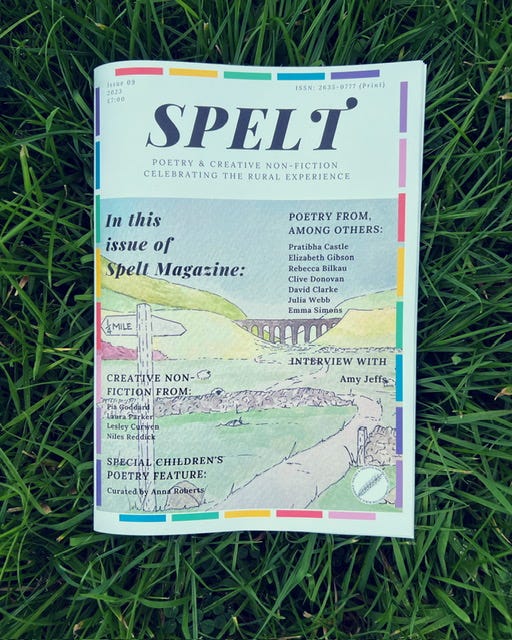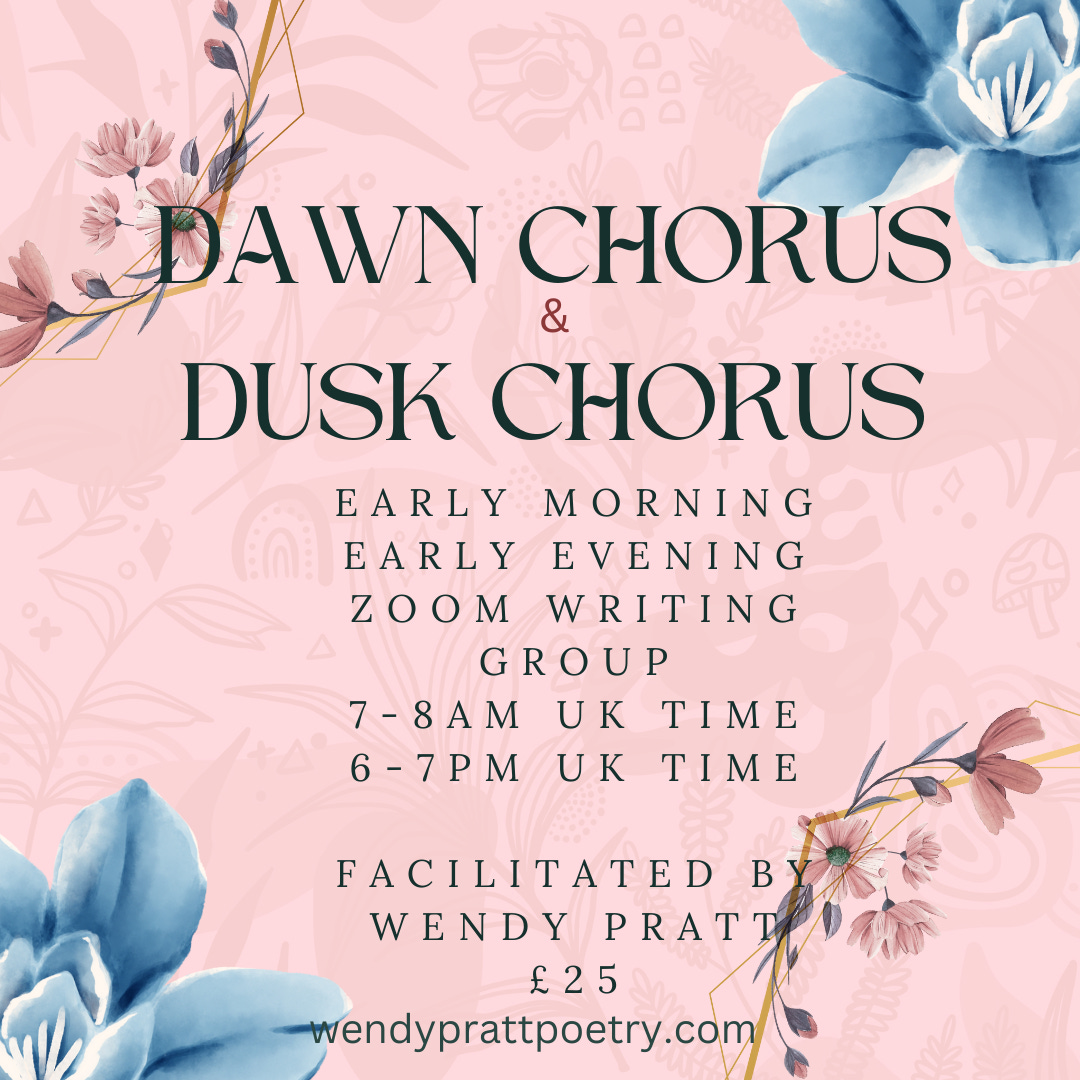Notes from Spelt Magazine - The Impossibility of Producing a Print Literary Magazine
An honest insight into the creative magazine sector

It is a truth universally acknowledged that to run a print literary magazine in the current climate of cost of living crisis, post brexit red tape and continuous reduction in arts funding, is to be slightly insane.
Spelt is a full colour print magazine which seeks to celebrate and validate the rural experience. We feature poetry, creative non fiction, poetry film author interviews and columnists.
In issue 09 we worked with an intern at York St John university whose interest was in children’s writing. We decided to devote a section to poems for children. It was a beautiful issue.
I founded Spelt magazine during the pandemic in 2020 with a £1600 crowd funded pot and a great deal of ambition. I felt there was a lack of non romanticised rural writing. When I looked for creative writing about rural life, nature, ecology etc, it was so often an observed act - a person moving to the countryside after living in a city, observing the difficulties of no buses past 6pm, the eccentric characters that lived in the village and the glorious, simple life of the rural; abandoning the grind of the hard city life for birdsong and grow-your-own. Rural life is glorious, but it’s not simple. It’s no more simple than anyone else’s life. When I looked for creative non fiction books about rural life, I found the same thing. There was a lack of creative writing about, and by, working class rural writers and rural people from minority groups, and rural people who lived rurally and had grown up rurally. I’m from a working class background myself and grew up rurally and didn’t see myself represented in the rural and nature writing that was out there.
Spelt doesn’t print exclusively working class rural creative writing, and we are actively working on our diversity, attempting to reach different audiences. We print all sorts of nature writing. But the core principle of the magazine remains - to encourage a move away from what I think of as a romanticised and distanced approach to nature writing and embracing something truer, something more authentic - closing the gap between people and nature, normalising being a part of the natural world rather than visiting the natural world and the rural life. The disconnect between people and nature is part of a wider problem that is causing increased factory and intensive farming methods and a sort of nonchalance about how we treat the planet. Our ecology is dying around us, and we seem to be distanced so much from nature that we don’t realise that that’s our ecology, that we are animals within that world ecology and that we are actively killing our own species.

I say all this as if a brightly coloured print magazine of poetry and creative non fiction can make a difference. But here is where I, as a writer, think this sort of work can make a difference. The arts make connections with people in a much different way to factual scientific reports and research. The arts create connection on an emotional level. Look at what happened when ITV showed a drama series about the Post Office scandal. Everyone was suddenly, rightly , enraged on behalf of those who had been treated so badly. I’m not saying poetry can do that. With the best will in the world, poetry reaches a niche audience. But the creative arts can. Spelt is ever evolving, we look to push outside of traditional nature writing boundaries, it’s why we began linking to poetry films, author interviews, and why we’ll be starting the Spelt podcast soon. Perhaps, in some tiny way, we can help to be part of a wider change.
This week, issue ten goes to the printers. Ten issues! A cause for celebration. It would not have been possible to get this issue to the printers without the generosity of people who donated money to help get the production costs of the next two issue’s (10 and 11) covered. I had to launch another crowd fund at the beginning of the year. Why did I have to crowdfund £1000 for issue ten and eleven? Barriers around making a print magazine work are greater than ever and the ground on which we stand is constantly shifting. For example, since we began producing Spelt we have not been able to send magazines into the EU due to the crippling effect of Brexit red tape. We can’t tell people what the local tax is on the package in advance, because it is infuriatingly vague and different in each country and state and province. The tax has to be paid by the customer, on receipt, and if they decide they don’t want to pay it, the magazine is returned to us and we have to pay it. We can’t risk that, it can be £20 plus pounds, more, if it’s returned from far away and that’s a lot of money on a magazine that realistically only makes £1.80 an issue after production and postage costs are met. We’ve also seen a phenomenal rise in printing costs driven by an increase in paper costs, and an increase in postage costs. To put this into real terms, the printing of the magazine was costing around £350, and now costs £500. I can’t raise the price of the magazine to meet that increase. And this increase happened between two issues. Postage which was, I think, around £1.80 per issue is now a solid £2.40 Again, I can’t raise the cost of the magazine to meet this. I will be putting the price up, but it won’t cover the costs. No one gets paid at Spelt, and that is a crying shame because the work that goes into it is enormous. And I can’t afford to pay my contributors either.
I have watched magazine after magazine, good magazines, necessary magazines, folding one after the other around us while we hang on my our fingernails because myself, my co editor Steve Nash and the Spelt poetry film editor Helen Dewbery believe that grass roots arts are important, that to see yourself represented in the arts is vital, that you have to see it to be it. And we are really, really stubborn.
Since our last Arts Council funding bid failed I will admit that I’ve slowed down on my Spelt duties. The bid was a huge amount of work (50 ish hours) and a real knock to the confidence to not be funded, again. The funding would have enabled a targeted growth and actively looking at ways to diversify, bringing in guest editors, out reach events etc. The rejection of our bid was made worse because I know there’s no real reason for us not being funded other than every literary magazine, festival and event is in the same boat, or rather we’re all outside of the boat thrashing about trying to stay afloat, we’re all grasping at the same pot. Some people got funding, others didn’t and we didn’t.
I’ll be having another go at getting funding, I’m far too obstinate and enraged not to. I believe we are providing a necessary platform for writers who wish to explore nature, landscape and ecology on their own terms and through the lens of their lived experience. I believe that nature writing should not just be an observed act and that we need more platforms that allow people to tell their own stories directly. I believe that Spelt does that. And I think there’s an audience for it, but I need to be able to reach that audience, which takes time and money.
I’m saying all this from a place of both pride as I watch Spelt Ten winging its way to the printers in glorious full colour and full of fascinating poems and creative non fiction and links to poetry film, and as I am about to interview Sharon Black about her poetry collection for the Youtube channel, and from a place of being a bit knackered fitting it al in around writing books and facilitating courses etc.
I want the print magazine to continue, but I also don’t want to be this guy:
Because it’s not fine. We have to remain ahead of the game, and always trying something new. Which brings me to the next Spelt venture: The Spelt substack.
There is nothing on there at the minute, but do give us a follow, there will be soon. Primarily, we want to use the substack platform for a new podcast. We’ve always done author interviews, so these will move to the podcast, but I want to do more: I want to talk to people living rural lives in different ways and doing extraordinary and ordinary things in the rural world. Perhaps you know someone like that? Let me know if you do. I’ll be posting other stuff on there too, occasional guest blogs, reviews, poetry, creative non fiction. Very little will be paywalled initially, but there is a payment option open that is there to allow people to support the work we are doing, if they want.
It feels good to be launching this as the equinox turns us towards brighter times.
Thanks for reading. I hope this post doesn’t sound defeatist, or angry or like I seek pity, it isn’t, I don’t. I am prouder than ever of the work we are doing with Spelt, despite the difficulties that we are facing. And long may it continue.
Dawn and Dusk Chorus Zoom Writing Groups
The Dawn and Dusk Zoom writing Groups return on April 1st 2024
These peaceful early morning and early evening writing groups are a Spelt initiative, facilitated by myself. Come and join us for an hour of gentle accountability, community and inspiration. Full details and bookings here:








Sorry you didn’t get the latest funding — it feels like exhausting times at the moment in the arts and in everything. Thank you though Wendy — Spelt is an important magazine.
Thank you. I love the magazine and will support it as best I can. Very well done, my inspiring friend. Xx